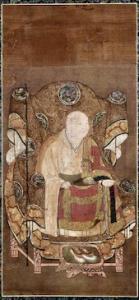
I hope you will find this post as grist for your dharma-reflection mill. You see, a couple things that have to do with the teacher-student relationship have come up in my translation work, and I’d like to share them with you.
The first is a line from Tōngxuán One Hundred Questions (通玄百問), “Question 54: What Phrase Is Most Wonderful?” The text features three Cáodòng (Japanese, “Sōtō”) teachers from the Thirteenth Century – Tōngxuán (Going Through the Mystery) asks the questions; Wànsōng (Ten Thousand Pines) gives a brief, usually four or five character, response; and Línquán (Forest Spring) adds a verse. Right now, I’d like to focus on this one line:
“Zen flows with diligent care in subtlety of critical examination.” (1)
What I’ve translated as “critical examination” (參詳, Japanese, “sanshō”) is “to take part in” and “detailed, complete, thorough.” As a binomial, “to examine thoroughly [with nondiscursive thought]” or “collate and examine critically (texts, etc.).” Further, sanshō refers to sanzen (參禪), “to thoroughly penetrate with meditative insight … under the guidance of a Zen master.” (3)
To paraphrase this line of Forest Spring: the truth and embodiment of Zen flows within the heartfelt work and refinement while teacher and student are engaged in nondual dharma introspection.
The second passage I’d like to share is a bit longer and comes from Record of Going Easy, “Case 53: Huángbò’s Offspring Slurp Dregs.” Below, I’ll first cite the kōan and then give you the selection from the commentary I’d like to highlight:
Huángbò addressed the assembly saying, “You people are gobblers of dregs. Wandering by foot like this, where is today? You should know that in all of China, there are no Zen teachers!”
A monk then came forward and asked, “What about all those who, in many places, lead followers – what do they do?”
Bò said, “I didn’t say no Zen, only no teachers.”
Excerpt from the commentary:
Duke Huan of Qi read a book above the main hall. Wheelwright Piān planed a wheel below the main hall. Piān looked up and asked, “May I ask the Duke, what are you reading?”
The Duke said, “The sayings of Confucius.”
[Piān] said, “Is Confucius alive?”
The Duke said, “Already dead.”
[Piān] said, “Then my lord is reading the dregs of an ancient.”
The Duke said, “When I, the Duke, read a book, and a wheelwright inserts a comment, then they must explain. If they cannot explain, they die.”
Piān said, “I, your servant, look at it in light of my work. When I plane a wheel slowly and gently then it is agreeable and not hard. When I plane a wheel swiftly, it is painstaking and not agreeable. When I plane a wheel neither slowly nor swiftly, then I get it in hand and heart. My mouth cannot express how. It comes from within each repetition.
“I, your servant, cannot teach it to my child. My child cannot receive it from me. Therefore, I’ve been going at it for seventy years, growing old planing wheels. The ancients who have died cannot transmit. That being the case, lord, you are reading the dregs of an ancient.” (3)
Click here for a talk, “We Are The Future Of Our Ancestors,” that includes some comments to this passage using the Cleary translation – the above is hot off the translation block.
(1) Translation by the author.
(2) Sources here are MDGB Chinese Dictionary and the Digital Dictionary of Buddhism.
(3) See Book of Serenity: One Hundred Zen Dialogues, trs., Thomas Cleary, p. 223-224, for another rendering. What I have translated as “It comes from within each repetition,” Cleary has as “There is an art to it….”

Dōshō Port began practicing Zen in 1977 and now co-teaches at the Nebraska Zen Center with his wife, Tetsugan Zummach Ōshō. Dōshō also teaches with the Vine of Obstacles: Online Support for Zen Training, an internet-based Zen community. Dōshō received dharma transmission from Dainin Katagiri Rōshi and inka shōmei from James Myōun Ford Rōshi in the Harada-Yasutani lineage. Dōshō’s translation and commentary on The Record of Empty Hall is due out in early 2021 (Shambhala). He is also the author of Keep Me In Your Heart a While: The Haunting Zen of Dainin Katagiri.











